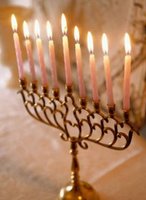The Challenge of Hanukkah

Hanukkah is a holiday of multiple and fluid meanings.
Originally, it was a holiday celebrating the Maccabees' military victory over the Seleucid Greeks. A war fought not so much for "religious freedom", as against the forces of Hellenization and Jewish assimilation. The war was bloody, and initially, at least, attacked the assimilated Hellenized Jewish elites, as much as, if not more-so than their Seleucid overlords. A reading of the Book Of Macabbees, I and II, makes this clear. Mattathias' cry, which sparked the revolt - "Mi Ladonai Aylai" "He who for God, follow me!" - was, after all, initially directed at a Jew about to sacrifice a pig, and it was that Jew who was the first victim of the revolt.
And so, many people use Hanukkah as a symbol for a militant - and military - religious conservatism and purity, in the face of liberalizing modernity. (See for instance, Michael Medved's article, "The Real Hanukah: A Celebration of the Religious Right" .)

The early Rabbis (or more properly the rabbinic precursors, the Pharisees), de-emphasized the military aspects of the holiday, and instead emphasized the re-dedication of the Temple, and the miracle of the oil. They did this largely because they hated the Maccabbean kings, who, by then, where corrupt and somewhat assimilated themselves, and who opposed the Pharisees' new fangled religious innovations that - ironically - included moving some religious worship away from the Temple and into the Jewish home and synagogue. By putting the emphasis of the holiday on the Temple, on the miracle of the oil, and on Jewish purity and separateness, they could undermine the Kingship, the role of the Maccabees military prowess, the importance of Jewish temporal sovereignty per-se, and at the same time display their loyalty to a hyper-pure Judaism and to Temple worship - but on their own terms. (The Pharisees so wished to repress the Maccabees' role, that the books of Maccabees where not included in the Jewish Bible, and survived only because of their inclusion in Catholic scripture. The Catholics likely preserved these books because of their stories of voluntary Jewish martyrdom in the face of "Greek" religious persecution, something that echoed strongly with the early Christians' own experience of martyrdom at the hands of Rome.)
The later Rabbis - post the destruction of the Temple in 70 AD - subtly changed, yet again, the meaning of the holiday. Even more radically then the Pharisees, they de-emphasized the role of military power. This can be seen in their choice of the Haftorah portion for the first Shabbat of Hanukkah; from Zecahriah chapter 4: ' "Not by might, nor by power, but by my spirit", says the Lord.' - to Zerubavel, the leader of the post Babylonian exile Jewish returnees attempting to re-establish the Temple. In other words - right makes might! Jewish sovereignty will be re-established only by way of ethical, godly behavior. Military power and sovereignty (alone ?) will not do it. Furthermore, rather than emphasize the xenophobic and militant "us versus them elements" of previous understandings of the holiday, they acknowledge that the Temple (and by extension Jewish sovereignty) can best be established when the Jews live in harmony and cooperation with their neighbours. Thus, the Haftorah portion chosen for the second Shabbat of Hanukkah - which will be read in synagogues around the world tomorrow; from I Kings chapter 7: '... So Hiram (King of the Phoenicians) finished all the work that he had been doing for King Solomon on the House of the Lord.'
The early Zionists, consciously re-emphasized the military elements of the Hanukkah story. But they re-cast it as primarily a national struggle, not a religious one. The elements of religious Jews fighting assimilated Jews are completely absent; and the Temple and the miracle of the oil are, at best, cute side-bars. The Maccabees' bravery, strength and military effectiveness are front and centre, as is the "victory of the few over the many." God, and godliness are absent.

Contemporary North American liberal Judaism has yet again re-constructed the meaning of Hanukkah. This time into a holiday of religious freedom, of tolerance and of multi-culturalism. The Maccabees' struggle is now understood to be about the right of the ancient Jews to worships as they wanted, and not to be forcibly assimilated into the majority culture.
Many of these meanings will ring true to us. Some will be anathema. The challenge of Hannukah is to decide what the deep meaning of the holiday is for us. What is it that WE are affirming? Tolerance, and faith in the power of the good? Or, faith in the power of military power, and need to stay apart? Or some combination of these themes?


0 Comments:
Post a Comment
<< Home